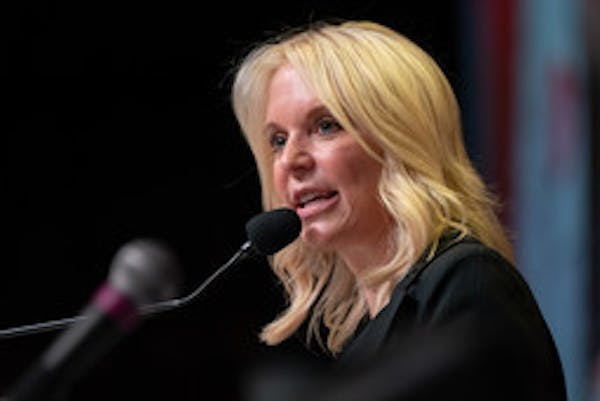Minnesota's incoming governor, who made education a key piece of his campaign, on Thursday picked the people who will help execute that work.
DFL Gov.-elect Tim Walz chose Mary Cathryn Ricker as the next commissioner of the Minnesota Department of Education and Dennis Olson to lead the Office of Higher Education. He also announced Paul Schnell as the new Department of Corrections leader.
It was the second round of commissioner selections this week as Walz staffs up and prepares to take office Jan. 7. He has 23 cabinet members to hire, and has so far announced eight of them. Walz said the announcement of education and corrections leaders together is intentional, as they aim to channel more young people into higher education and prevent them from entering the criminal justice system.
Schnell will take over the Corrections Department at a challenging time, following two recent prison attacks that killed two corrections employees and injured more than a dozen others. The union representing correction officers is pushing the Legislature to hire 327 more officers, and has said morale is low and many employees have left. Schnell said he is committed to making the department a good workplace, starting with making sure people feel safe.
"This administration pledges to do everything in our power to keep these brave correctional officers as safe as possible," Walz said. "... Paul understands the importance of this work and how it ties directly to our efforts to seek justice, foster rehabilitation and reduce incarceration rates."
Schnell has been the Inver Grove Heights police chief for the past year and is an adjunct faculty member at Metropolitan State University and the University of St. Thomas. He previously served as police chief in Maplewood and Hastings after holding a variety of posts at the St. Paul Police Department.
Corrections and law enforcement are very different, said Warren Limmer, R-Maple Grove, chairman of the Senate Judiciary and Public Safety Finance and Policy Committee, and he's concerned that Schnell's background is primarily in law enforcement.
"I'll be anxious to be convinced that he can take a sidestep from one field to a completely different one," said Limmer, a former corrections officer.
The Corrections Department has 4,300 employees. It has struggled to hire enough staff and often has 80 to 100 job openings, Limmer said, and as legislators consider the additional staffing request he said they will be pressing the administration on how they will fill the already funded but empty jobs.
Walz, a former Mankato West High School teacher, frequently focused on education — from early childhood learning to higher education — as he campaigned across Minnesota. He and his commissioners will need to work with a Republican Senate majority and Democratic House majority as they push for change.
Walz has proposed providing college students whose families make less than $125,000 annually with two years of free tuition at state schools. He also wants to expand pre-Kindergarten programming, invest more in schools and close the persistent achievement gap between students of color and white students.
"We are cognizant that right now some ZIP codes deliver different experiences to our students than others ... We will continue to work to change this," said Ricker, a former teacher who is the executive vice president of the American Federation of Teachers.
Before she was elected to the national position, Ricker was president of the St. Paul Federation of Teachers. She serves on the governing board of the teacher's union Education Minnesota. She is taking over one of the state's most high-profile agencies. About 40 percent of the state's approximately $48 billion two-year general fund budget is spent on early childhood through high school education.
Sen. Carla Nelson, R-Rochester, chairwoman of the E-12 Finance and Policy Committee, planned to talk with Ricker Thursday and said she looked forward to working with her, but noted the union leader will need to have "a complete mind shift" from growing union membership and working for adults.
"It's always important to know who your audience is. And in this case, it's not the unions. This audience, these goals, are working for students and outcomes," Nelson said.
Olson, the next higher education commissioner, is executive director of the Minnesota Indian Affairs Council, where he works with state government and tribal elected leaders on issues affecting American Indian communities. He brings a history of working with tribal communities on education, including time as director of the Office of Indian Education at the Minnesota Department of Education and as commissioner of education for the Mille Lacs Band of Ojibwe.
Olson said he wants to increase collaboration across Minnesota's college campuses and better align higher education with career paths.
State law caps salaries for agency heads at $169,747, which is 133 percent of the governor's salary of $127,629. Current agency head salaries are below the limit, ranging from about $120,000 to $155,000.
Jessie Van Berkel • 651-925-5044

Fact check: Walz and Vance made questionable claims during only VP debate

In Tim Walz's home city, opposing groups watch him debate on the national stage

